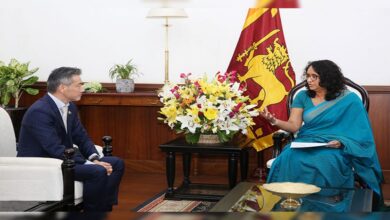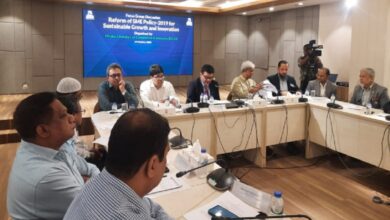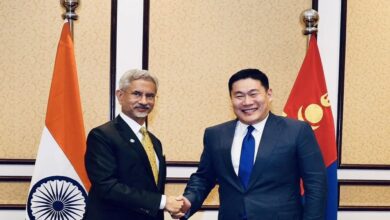Bangladesh government’s new turn in global trade policy
Dhaka has formally offered to join the world’s largest trade alliance China-led Regional Comprehensive Partnership Agreement (RCEP). Recently, the application form has been sent to the headquarters of the organization through the Ministry of Foreign Affairs of Bangladesh. Being a member of RCEP will not require free trade agreements (FTAs) with its member countries in the future.
However, despite the increasing importance of RCEP at this time, the interim government is moving away from the long-discussed Comprehensive Economic Partnership Agreement (CEPA) with India.
Those concerned are of the opinion that the present government has taken a new turn in global trade policy by moving away from ‘Sepa’ and joining the China-led alliance ‘RCEP’.
When asked, Commerce Secretary Mohang Salim Uddin said that no initiative is being taken for the time being regarding the signing of SEPA with India. However, the Principal Adviser has already agreed to join the RCEP as a member. And there will be no need to make free trade agreements (FTAs) with member countries if there are no additional benefits in terms of trade if they join the RCP. FTAs will be with the respective member countries only if there are more trade benefits than the RSEP. He further said, now we will prepare an action plan. The ministry is working on it.
According to the sources, the chief advisor Dr. has recently agreed to join the RCEP. Muhammad Yunus. A summary is sent from the Ministry of Commerce for his approval. It is said there, ‘In terms of scope and scope, ARCP is a free trade agreement of a high quality, modern and comprehensive nature, where trade in goods, trade in services, investment, economy, technical assistance, intellectual property rights, grievance redressal, e-commerce and SMEs are also included in the scope of this agreement. The alliance accounts for 30 percent of the world’s total GDP and population, 31 percent of foreign direct investment and a quarter of total trade in goods and services. The alliance is essentially creating supply chains in the region by eliminating tariff barriers.
The summary sent to the Chief Adviser stating the arguments in favor of joining the RCEP also mentioned that Bangladesh’s accession to the RCEP would increase USD 3.6 billion in exports and USD 3.36 billion in foreign investment in the current scenario. A significant portion of the export growth will come from the apparel sector. As a result, the demand for workers in this sector will increase by 18 percent. Overall, joining this trade alliance will increase the GDP of Bangladesh by 0.26 percent.
However, if the capacity cannot be increased, the export sector will face uncompetitiveness. Besides, there will be several challenges in services, e-commerce, investment and other sectors and adverse impact on tax revenue collection. The Ministry of Commerce has planned to take necessary activities in cooperation with the concerned ministries to face these challenges.
Highlighting the benefits of joining the RCEP, the Chief Adviser was informed that South Bangladesh will get benefits from the member countries of the Asian Regional Forum (ARF) if it is included in this alliance. There will be no need for separate negotiations with the countries of the region especially in terms of getting market benefits. This will lead to commercial and strategic gains in the regional and international arena by joining the global chain by retaining tariff benefits even after LDC graduation.
As a result, Bangladesh may send a formal proposal to initiate the appropriate process to join the ‘Regional Comprehensive Partnership Agreement (RCEPA)’ for trade expansion and strategic position review. However, in the course of negotiations, the necessary number of intensive research activities will be carried out in the applicable cases by taking utmost precautions to protect the interests of the country.
How far SEPA has progressed: Sheikh Hasina’s government signed the Preferential Trade Agreement (PTA) with Bhutan for the first time. This was followed by the signing of the Comprehensive Economic Partnership Agreement (CEPA or CEPA), a much broader economic partnership agreement with India than the Free Trade Agreement. In which, apart from bilateral duty-free facilities, regional connectivity, investment and service sector were also included. For this a joint probability test is performed. It is said there, if the SEPA is signed, the export income of Bangladesh will increase by 300-500 million US dollars in seven to 10 years. Although at the same time India’s income will increase from 400 to 1000 million dollars.
Soon after taking initiative to sign SEPA with India, China offered to sign FTA with Bangladesh. In the meeting of officials of the two countries, Bangladesh expressed its interest in signing an FTA with China, but the previous government did not actually take any initiative. During Sheikh Hasina’s visit to India before the last parliamentary elections, the Prime Ministers of the two countries announced the start of negotiations for the signing of the Sepa. Then the Ministry of Commerce sought the approval of the then Prime Minister to apply for joining the RSEP. Several former and current officials of the Ministry of Commerce said on condition of anonymity that India has banned Bangladesh from joining RSEP. The neighboring country said that if Bangladesh joins the RCEP, India will not sign the CEPA agreement. In this context, Sheikh Hasina withheld the file without signing the application to join RSEP. They said Hasina government did not want to make India unhappy before the last election. That is why the matter of joining the RCEP was delayed.
Benefits of joining RCEP: By joining RCEP, Bangladesh will reduce tariffs or duties by 90 percent of its trade within the first 10 years. An additional 15 years will be available for the remaining 10 percent tariff reduction. Apart from this, out of the countries with which Bangladesh is currently negotiating to sign Free Trade Agreements (FTAs), six countries are Japan, Indonesia, Malaysia, Singapore, South Korea and China are currently members of RCEP.
It is known that the commercial alliance of 15 countries is ARCEP. With a total population of about 2.3 billion (30 percent of the world’s total population) and a total market of $26.3 trillion. The countries included in the RCEP include Australia, Brunei, China, Indonesia, Japan, South Korea, Malaysia, Myanmar, New Zealand, Philippines, Singapore, Thailand and Vietnam. In the 21st century, the heart of the world economy will be the countries of East Asia, including ASEAN, which are part of the Arcep. Those concerned think that it would be logical for Bangladesh to be connected with the heart of the world economy. While ARCP is called a China-led trade bloc, close US allies Japan, South Korea and Australia are also members of the bloc. Moreover, India can become a member of RCEP as a founding member at any time. This is because India was initially involved in the process of forming the RCEP, but came at the last moment and did not sign the agreement.





